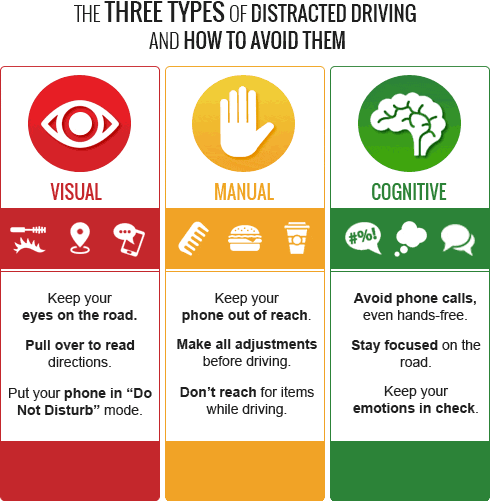Three Types of Driving Distractions
By its very nature, driving demands an extremely high percentage of your attention (if not all of it). Yet, as you get more experienced and comfortable with driving, you might find yourself more willing to spread your attention across numerous distractions.
Still, no matter how experienced you are, the more you become distracted while driving, the more your risk of getting into a car accident exponentially grows.
When it comes to understanding and avoiding distracted driving, it's best to look at the three types of driving distractions:
- Manual.
- Visual.
- Cognitive.

Manual Driving Distractions
Manual distractions cause you to take one or both hands off of the wheel. Some examples include:
- Eating and drinking.
- Adjusting your child's seatbelt.
- Smoking.
- Searching through your purse or wallet.
- Turning knobs in your car.
Visual Driving Distractions
Visual distractions cause your eyes wander off of the road. For instance:
- Looking for items on the floor of the car.
- Checking and adjusting your GPS.
- Changing the radio station.
- Adjusting your temperature controls.
- Taking in the view.
- Doing your makeup.
Cognitive Driving Distractions
Cognitive distractions cause your mind's focus to drift away from your driving.
Here are some common cognitive driving distractions:
- Talking to another passenger.
- Thinking about something that is upsetting.
- Road rage.
- Daydreaming.
- Being under the influence of drugs and/or alcohol.
Drowsy driving can also be considered a form of cognitive distraction, but is typically regarded as a separate problem of its own.
Texting While Driving
You may have noticed that some activities fall under more than one of the distracted driving categories. These activities are extra dangerous, as they tend to take more attention away from your driving than distractions that fall under only one category.
Texting while driving is an especially dangerous habit, as it falls under all three types of distracted driving.
While texting, you are distracted:
- Visually as you look at your phone rather than the road and cars around you.
- Manually as you type your messages rather than keep your hands on the wheel and ready to react.
- Cognitively as you concentrate on your conversation rather than the situation unfolding in your driving environment.
Avoiding the Distractions While Driving
Clearly there are several distractions that can take your attention away from driving. The good news is there are ways to avoid them.
Keep these tips in mind to help you drive distraction free:
- Stay calm.
- Anxiety and stress can be a big distraction. Take deep breaths and keep your focus on the road.
- Pull over.
- If, for whatever reason, you can't seem to keep your focus, find a safe place to pull over and take a break.
- Avoid pulling over on the side of a busy street, or in dark and isolated places.
- Keep the peace.
- Driving is not the time for arguments, which can be VERY distracting. Save the fight for when you are in a safer setting.
- Use your passengers.
- When possible, put your passenger in charge of tasks like temperature control or changing the music.
- Know your dials.
- This is especially important when you are driving a new car, or a car you are not used to driving.
- Get to know the car's controls BEFORE you start driving. This will help minimize distractions in cases where you must use one of the car's controls.
- Use your radio presets.
- Most car stereos allow you to preset stations so that you only have to press one button to hear what you want.
- Make adjustments before you start driving. These include:
- Mirrors.
- Seat.
- Steering wheel.
- Stay off your phone.
- Cell phone use, whether for texting or talking, is a huge distraction. Put your phone away, and do not let yourself use it until you are out of your car.
- There are even some smartphone apps that will help keep you from driving distracted.
- Be rested and satisfied.
- If you are going for a long trip, make sure you have had plenty of rest, food, and drink.
- Remember to factor meal times into your schedule so that you don't feel pressured into eating while driving to make it to your destination on time.
- Set up your GPS before you start driving.
In the fast-paced, multitasking world that we all live in, driving distraction-free can be difficult—but it is possible! Take the pledge against distracted driving today, and begin to live and drive in a safer world.
To learn more and test your knowledge of distracted driving, quiz yourself here.